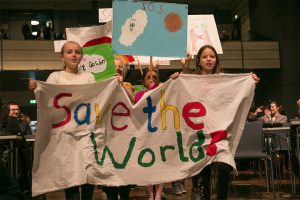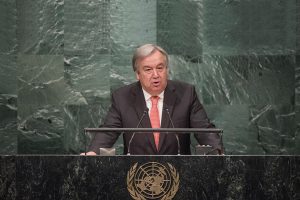16 December 2018: The Katowice Climate Change Conference convened from 2-15 December 2018, in Katowice, Poland, concluding in the wee hours of 16 December with a decision that will facilitate efforts to implement the Paris Agreement on climate change. The meeting had been tasked with delivering a set of guidelines to operationalize the treaty.
The two-week meeting focused on completing work on the Paris Agreement Work Programme (PAWP), a set of decisions meant to serve this goal. With the closing gavel, Parties adopted the Katowice Climate Package, which includes decisions on nearly all of the issues mandated as part of the PAWP. The Earth Negotiations Bulletin summary from the meeting highlights that COP 24 outcomes include:
- on mitigation: further guidance in relation to nationally determined contributions (NDCs), common time frames, and modalities, work programme, and functions under the Paris Agreement of the forum on the impact of the implementation of response measures;
- on adaptation: further guidance on adaptation communication;
- on finance: identification of the information to be provided by Parties in accordance with Agreement Article 9.5 (ex ante finance transparency), matters relating to the Adaptation Fund, and setting a new collective quantified goal on finance;
- on technology: scope of and modalities for the periodic assessment of the Technology Mechanism, and the technology framework;
- modalities, procedures, and guidelines for the transparency framework for action and support;
- the global stocktake (GST); and
- modalities and procedures for the effective operation of the committee to facilitate implementation and promote compliance.
The UNFCCC has emphasized that the Katowice Climate Package establishes guidelines that will:
- operationalize the transparency framework;
- define the process for establishing new targets on finance from 2025 onwards to follow up on the current target of mobilizing US$100 billion per year from 2020 to support developing countries;
- establish how to conduct the GST of the effectiveness of climate action in 2023; and
- define how to assess progress on the development and transfer of technology.
Outcomes highlighted during the high-level segment (HLS) include declarations on e-mobility, and solidarity and just transition and forests and climate.
In the crucial year of 2020, the Paris Agreement will face its first true litmus test.
The UNFCCC notes that “issues still to be resolved” include the use of cooperative approaches and the sustainable development mechanism, as contained in Paris Agreement Article 6, which would allow countries to meet, in part, domestic mitigation goals through market mechanisms such as carbon markets.
Among the key announcements and pledges made during the Katowice Climate Change Conference were:
- US$200 billion in climate action funding from the World Bank for the period 2021-2025;
- nearly US$129 million for the Adaptation Fund;
- plans by Multilateral Development Banks (MDBs) to align activities with the goals of the Paris Agreement; and
- plans by the C40 Cities coalition to work with the IPCC to identify how the Special Report on Global Warming of 1.5°C (SR15) can apply to cities’ climate actions.
The conference included meetings of the three governing bodies of the UNFCCC, the Kyoto Protocol, and the Paris Agreement, and the three subsidiary bodies. The Katowice Climate Change Conference brought together over 22,000 participants, including nearly 14,000 government officials, over 7,000 representatives from UN bodies and agencies, intergovernmental organizations, and civil society organizations, and 1,500 members of the media.
The Earth Negotiations Bulletin analysis notes that, “many delegates left Katowice feeling cautiously uplifted, looking ahead to 2019 when the UN Secretary-General, who personally facilitated the negotiations during the second week, will hold a Climate Summit to raise ambition ahead of the crucial year of 2020, when many countries will deliver updated NDCs and the Paris Agreement will face its first true litmus test.”
As decided at COP 24, COP 25 will take place in Chile in November 2019. [IISD RS meeting coverage] [UNFCCC Press Release]


